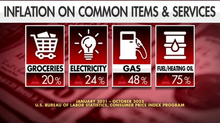What Putin wants from the Pope

President Vladimir Putin visits Pope Francis in November 2013 (Getty)
Russian President Vladimir Putin must have been nervous. Pope Francis’s foreign policy has been agreeable to Moscow. But ominous clouds were on the horizon.
In May, the Vatican announced a meeting for July 5-6 in Rome for the leadership of the Ukrainian Greek Catholic Church (UGCC), the largest of the Eastern Catholic Churches. The head of the UGCC, His Beatitude Sviatoslav Shevchuk, the synod council which governs the Church and the UGCC metropolitan archbishops were invited to meet with Pope Francis and the senior members of the Roman Curia. The official reason was to support the UGCC “in the delicate situation in which Ukraine finds itself”.
True enough, Ukraine is in a most delicate situation. Politically, the world has more or less decided to live with Russia’s annexation of Crimea and invasion of eastern Ukraine. Religiously, the recognition by the Ecumenical Patriarch of Constantinople of a new, independent, unified Orthodox patriarchate of Kiev has enraged the Russians, who hold that Ukraine belongs to the canonical territory of the Orthodox Patriarchate of Moscow.
But the “delicate situation” also includes relations between the UGCC and the Holy See, which have deteriorated over the last five years. The Holy Father greatly desires good relations with the Moscow Patriarchate, and the price of those good relations is to go easy on Putin, with the whom the patriarchate is closely allied.
Practically that has meant muted criticism, at best, of Russian aggression in Ukraine. Indeed, the preferred formulation of Pope Francis was that both sides were at fault, the invader and invaded. Only when the UGCC protested vehemently against such formulations did the Holy See offer a critical word in Putin’s direction.
Just over a year ago, Pope Francis, in receiving a delegation from the Moscow Patriarchate, took their side in the dispute with Constantinople over the independent patriarchate in Kiev. Pope Francis went further, saying that the UGCC itself should take Moscow’s side too.
That brought Shevchuk to Rome for an emergency audience with the Holy Father to clarify that the official position of the UGCC was neutrality between Moscow and Constantinople about the canonical status of Kiev. At the same time, both as Christians and Ukrainians, the UGCC hoped for greater unity among the Orthodox in Ukraine. They were sympathetic to a unified, autonomous Kiev Patriarchate, which now exists.
So Moscow – both President Putin and Patriarch Kirill – were confident that they had a reliable ally in Pope Francis, but saw that he was unsuccessful in forcing Rome’s line on the UGCC. What then did the surprise announcement of this week’s special summit with the UGCC leadership mean? Was this a worrisome portent as seen from Moscow? Might the Holy Father be persuaded to support the UGCC more explicitly, and shift Holy See diplomacy in that direction?
It did not take long for Moscow to act. Just weeks after the summit was announced, Putin persuaded Pope Francis to receive him at the Vatican on July 4, just the day before the Ukrainian summit begins. The timing was hardly subtle. Putin wanted the Holy Father to be fully apprised before the summit as to Moscow’s position. He thought it best to do so in person.
Putin is clearly attempting to keep the Holy Father on a short leash. The question is whether Pope Francis will accept that. Who will have greater influence? The UGCC or Moscow?
Last summer, the respected Vatican analyst John Allen asked whether Pope Francis had moved past “flexibility and pragmatism” in his Russia policy and instead offered Putin “craven placation”. It is unlikely that Putin finds the Holy Father “craven”, but there can be no doubt that he has been pleased to be placated.
In return, Putin gave the green light for Kirill to meet Francis in 2016, though the price of the meeting was steep. It would be held not in an ecclesial setting, but would be hosted by the Castro regime at the Havana airport. And the joint communiqué downgraded the status of the UGCC. Pope Francis got the ecumenical meeting he wanted and Moscow got everything else.
Both political and ecclesiastical Moscow were content with that arrangement. Does the Ukrainian summit suggest that it might change? Perhaps it might, as the UGCC would certainly hope. But not if Putin has anything to say about it. And the Holy Father will hear it from him directly first.
Fr Raymond J de Souza is a priest of the Archdiocese of Kingston, Ontario, and editor-in-chief of convivium.ca
Original article at the Catholic Herald, here.










































